Incoming and outgoing International Olympic Committee (IOC) presidents Kirsty Coventry and Thomas Bach yesterday saluted each other in the handover ceremony, but the person they should thank for the movement’s continued existence is Juan Antonio Samaranch Senior.
Samaranch Senior — whose son of the same name finished runner-up to Coventry in the IOC presidential election in March — did, like Coventry, serve in a controversial regime prior to being elected in 1980.
While Coventry has been sports and arts minister in a Zimbabwean government whose election in 2023 was declared unfair and undemocratic by international observers, Samaranch served at a high level in the fascist Spanish regime of Francisco Franco.
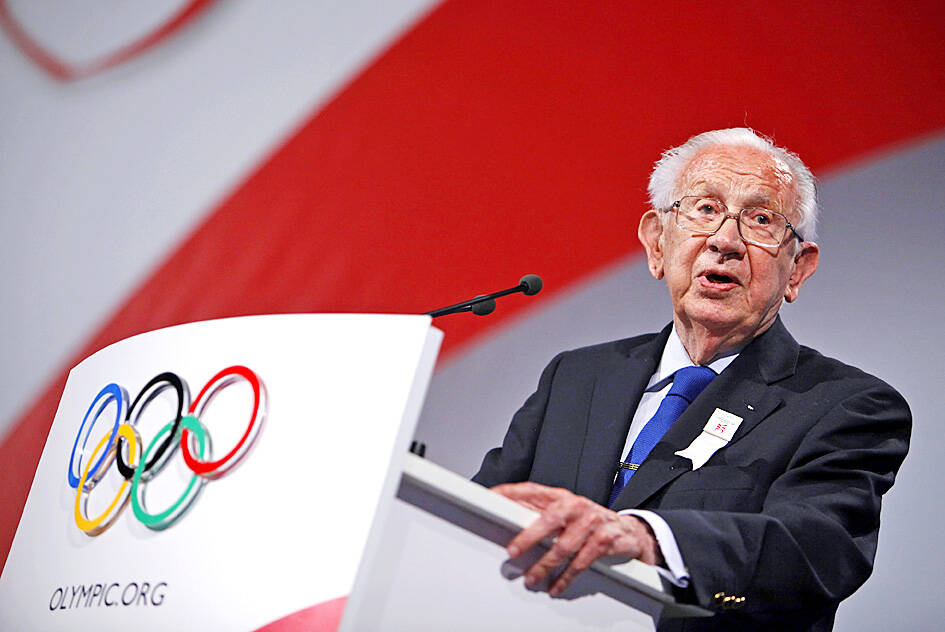
Photo: AP
His IOC presidency, which ran from 1980 to 2001, would for some be forever overshadowed by the “votes for favors” scandal surrounding the 2002 Salt Lake City Winter Olympics. However, to other more measured voices he is the savior of the Games who transformed it from a movement at risk of extinction into a vibrant and financially healthy behemoth.
“His legacy is that we have an Olympic Games to talk about,” former IOC marketing executive Terrence Burns said. “He saved it from financial and political ruin.”
Samaranch Senior’s earlier career exercised many people when he was IOC chief.
After Franco’s death and the restoration of the Spanish monarchy, Samaranch Senior went on to be ambassador to the Soviet Union.
“I recognized that my political career in Spain was over,” said Samaranch Senior, who always insisted he was not a fascist.
It was in Moscow at the 1980 Games, overshadowed by a boycott because of the Soviet invasion of Afghanistan, that he was elected president of the IOC.
The IOC members’ faith in him was more than repaid.
“Within the IOC I think the Samaranch legacy is fully understood: that he saved the Olympic Movement,” former IOC marketing chief Michael Payne said.
His success was developing “the business model,” which included a TV strategy and “the creation of the TOP [the Olympic Partner] program, the most successful [sports] marketing program ever,” he added.
Payne worked closely with him and said he was a different personality to his son in that he was “more a listener” than Samaranch Junior, who is a “great communicator.”
“He was very introverted, a great listener, didn’t do a lot of talking and a great strategic thinker,” Payne said. “But because he wasn’t at the forefront, communicating and explaining, he was often misunderstood.”
“He only learned English as his third or fourth language when he was 60,” Payne said.
He said Samaranch’s leadership shone through during the Salt Lake City scandal.
Six members were to be expelled, and Samaranch also oversaw a series of reforms to prevent a repeat of the situation.
“He was calm under unbelievable pressure and stress,” Payne said.
“Honestly, you went to the office every day and you didn’t know if the organization would survive ... and that was for three months,” he said. “It was brutal, and yet, Samaranch Senior displayed absolute calm, focus.”
Nevertheless Samaranch, in a rare moment of letting the mask slip, revealed the effect of what Payne described as “personal attacks.”
“Retiring myself after the Barcelona Games (in 1992), I could have been a hero, no?” he told the Los Angeles Times in 2000. “I cannot regret. I have to write my history again.”
Payne said despite his diplomatic background, Samaranch could play hardball.
One incident occurred when Greece refused to allow the Olympic torch to be lit ahead of the 1984 Games in Los Angeles, as they objected to the commercialization of the event.
“Samaranch sent one of his relatives to Olympia to privately film the lighting of the flame, put it in a miner’s lamp and brought it back to Lausanne,” Payne said. “Then Samaranch called the Greeks and said: ‘Just for you to understand, I now have the Olympic flame on my desk. Either you will agree to let the Americans come and properly light it or there will never be another torch lighting in Olympia, because it will be lit at the Olympic Museum in Lausanne.’”
“So, he wasn’t shy of being very tough,” Payne added.
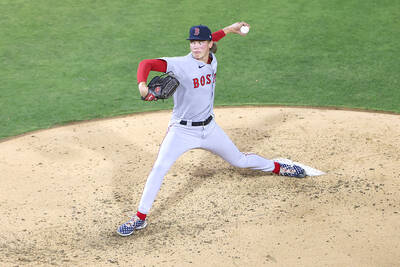
Boston Red Sox pitcher Connelly Early on Tuesday struck out 11 in five shutout innings to match a franchise record during his MLB debut against the Oakland Athletics. “Pretty sick performance,” teammate Romy Gonzalez said. “It was fun to watch.” The only other Red Sox starter to rack up 11 strikeouts in his first career game was Don Aase versus the Milwaukee Brewers on July 26, 1977. “It was amazing, just to go out there and have that first opportunity,” Early said after getting the win in a 6-0 victory. “A long day of travel yesterday and just getting to the field, seeing
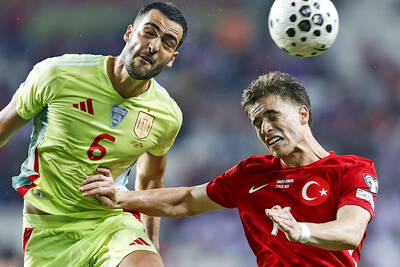
Mikel Merino on Sunday scored a hat-trick as a majestic Spain thumped Turkey 6-0 away in World Cup qualifying, while a brilliant Florian Wirtz free-kick helped Germany beat Northern Ireland 3-1 to get their bid up and running. European champions Spain were in unstoppable form in the central Turkish city of Konya, claiming their second biggest-ever away win in World Cup qualifying as Arsenal midfielder Merino scored his first professional hat-trick. Barcelona playmaker Pedri Gonzalez opened the scoring inside six minutes and later completed the scoring, with Ferran Torres netting the visitors’ other goal. The quality of Merino’s strikes was remarkable, with his
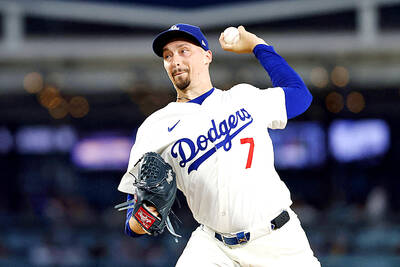
ELEVEN STRIKEOUTS: Blake Snell allowed two singles and two walks against the Rockies as he ended a personal three-game skid with his first win since Aug. 16 Blake Snell on Wednesday struck out a season-high 11 in six innings, while Mookie Betts hit a grand slam in the eighth as the Los Angeles Dodgers defeated the Colorado Rockies 9-0 for their fourth straight win. Helped by their third series sweep of the Rockies this MLB season, the Dodgers increased their National League West lead to three games over the San Diego Padres, who lost 2-1 at home to the Cincinnati Reds. Betts went four for five with five RBIs, capped by his seventh career slam on a 3-0 pitch from reliever Anthony Molina to make it 8-0. Andy Pages and
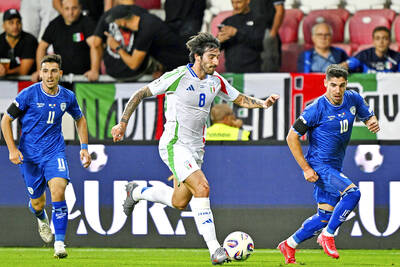
SWEDEN BEATEN: Goals in the first half by Elvis Rexhbecaj and Vedat Muriqi were enough to give Kosovo their second-ever win in World Cup qualifying Sandro Tonali’s last-gasp winner on Monday edged Italy to a 5-4 victory over Israel in FIFA 2026 World Cup qualifying, while Kosovo beat Sweden despite Alexander Isak making his first appearance of the season. After collapsing from leading 4-2 in the final two minutes to drawing 4-4, Tonali’s 91st-minute strike in the Hungarian city of Debrecen sent Italy above Israel and into the playoff spot in Group I. New coach Gennaro Gattuso’s side trail leaders Norway by three points and still have a chance of taking first place and the group’s sole direct qualifying spot as they seek to avoid missing out